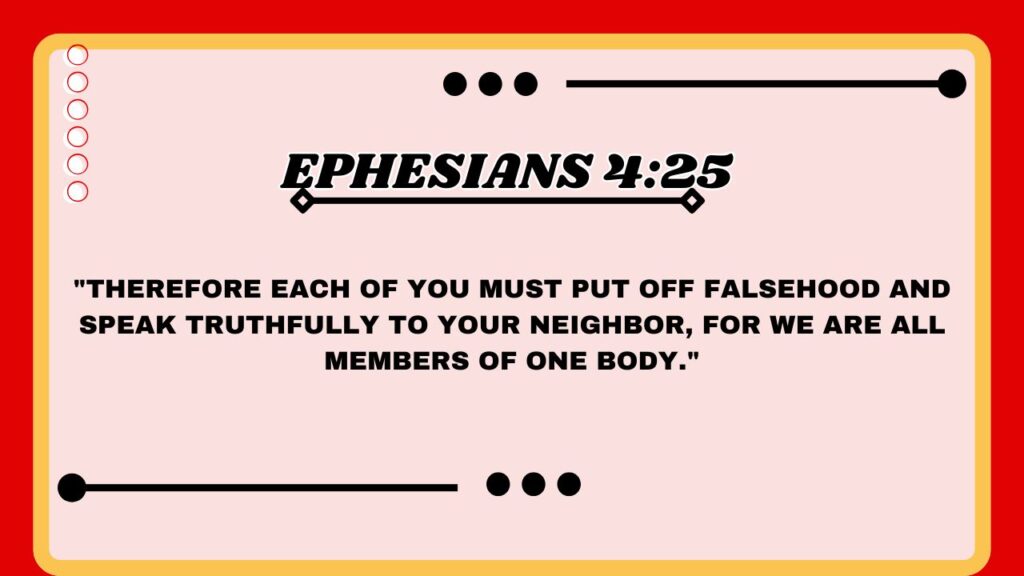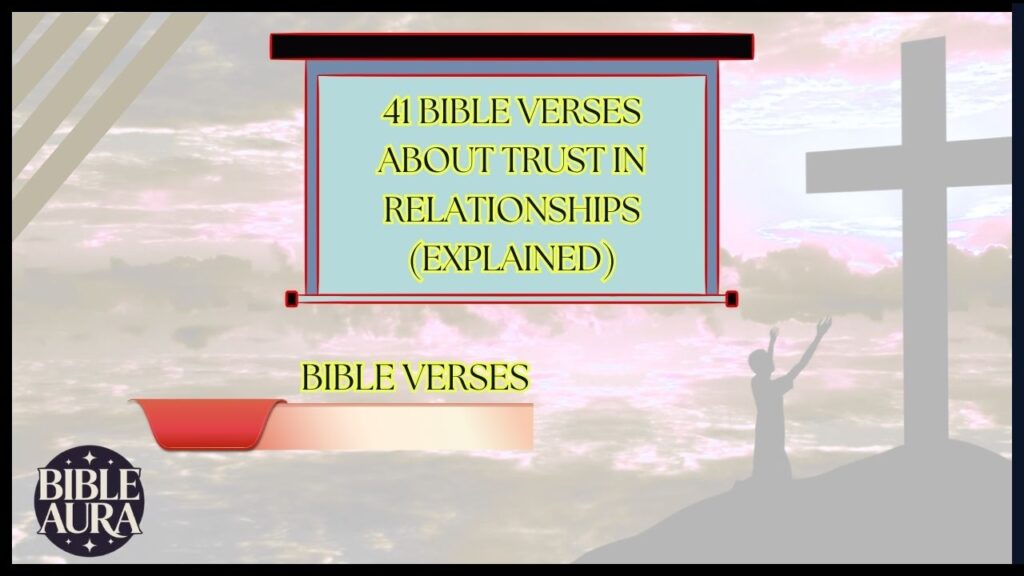Bible Verses About Trust in Relationships: Trust forms the cornerstone of every meaningful relationship, yet it remains one of the most fragile aspects of human connection.
Whether you’re navigating challenges in your marriage, struggling with trust in friendships, or working to rebuild broken bonds with family members, the Bible offers profound wisdom for cultivating and restoring trust in relationships.
When betrayal wounds our hearts or disappointment shakes our foundation, Scripture reminds us that authentic trust begins with our relationship with God.
The journey of building trust in relationships isn’t just about human effort it’s deeply rooted in biblical guidance and Christian values.
From Proverbs teaching us about loyalty and integrity to Jesus Christ’s example of sacrificial love, God’s Word provides a roadmap for creating covenant relationships that reflect His character.
These verses don’t just offer comfort; they provide practical steps for establishing mutual respect, practicing forgiveness, and experiencing spiritual growth through our connections with others.
Understanding trust in God’s timing becomes essential when relationships face trials. The Lord calls us to extend the same grace and mercy He shows us, creating space for healing after betrayal and opening pathways to restored relationships.
Through faithful companionship modeled after Christ’s love, we learn that true trust isn’t built on perfection but on commitment, patience, and unwavering faith in God’s transformative power.
Also Read: 39 Important Bible Verses About Home
Bible Verses About Trust in Relationships
Trust as the Foundation of Love (Verses 1-5)
1. 📖 1 Corinthians 13:7
“Love bears all things, believes all things, hopes all things, endures all things.”
🔍 Meaning: True love in relationships involves believing the best about others and maintaining hope even during difficult seasons. This verse teaches us that Christlike love doesn’t give up easily but perseveres through challenges with trust and patience.
💡 Application: When your spouse or friend disappoints you, choose to believe in their potential for growth rather than focusing solely on their failures.
2. 📖 Proverbs 31:11
“The heart of her husband trusts in her, and he will have no lack of good things.”

🔍 Meaning: This verse highlights how trust in marriage creates abundance and blessing. When a husband has complete confidence in his wife’s character and decisions, it produces peace and prosperity in their relationship.
💡 Application: Build trustworthiness in your marriage by being consistent in small promises and transparent in your decisions.
3. 📖 Ecclesiastes 4:12
“Though one may be overpowered, two can defend themselves. A cord of three strands is not quickly broken.”
🔍 Meaning: Relationships built with God at the center possess supernatural strength. The “third strand” represents Christ binding two people together, creating unity that withstands external pressures and internal struggles.
💡 Application: Include prayer and biblical guidance as regular practices in your relationships to strengthen your bond beyond human effort.
4. 📖 Proverbs 17:17
“A friend loves at all times, and a brother is born for a time of adversity.”
🔍 Meaning: Authentic friendship loyalty remains constant regardless of circumstances. True friends demonstrate love and support especially when life becomes challenging, proving their trustworthiness through consistent presence.
💡 Application: Show up for your friends during their difficult seasons, not just when it’s convenient or comfortable for you.
5. 📖 1 Peter 4:8
“Above all, love each other deeply, because love covers over a multitude of sins.”
🔍 Meaning: Deep love in relationships involves choosing forgiveness over keeping score of wrongs. When we love others with Christ’s heart, we create space for grace and healing instead of harboring resentment.
💡 Application: Practice covering your loved one’s mistakes with understanding rather than exposing every fault to others.
Trust Through Forgiveness and Grace (Verses 6-10)
6. 📖 Matthew 18:21-22
“Then Peter came to Jesus and asked, ‘Lord, how many times shall I forgive my brother or sister who sins against me? Up to seven times?’ Jesus answered, ‘I tell you, not seven times, but seventy-seven times.'”
🔍 Meaning: Jesus Christ teaches unlimited forgiveness as the pathway to trust restoration. This doesn’t mean ignoring harmful behavior, but rather maintaining a heart ready to reconcile when genuine repentance occurs.
💡 Application: Keep your heart open to forgiveness while establishing healthy boundaries to prevent repeated harm.
7. 📖 Ephesians 4:32
“Be kind and compassionate to one another, forgiving each other, just as in Christ God forgave you.”
🔍 Meaning: Our forgiveness toward others should mirror God’s mercy toward us. This verse establishes the foundation for rebuilding trust we extend grace because we’ve received immeasurable grace from our Heavenly Father.
💡 Application: When someone breaks your trust, remember your own need for God’s forgiveness and let that humility guide your response.
8. 📖 Colossians 3:13
“Bear with each other and forgive one another if any of you has a grievance against someone. Forgive as the Lord forgave you.”
🔍 Meaning: Patience and forgiveness work together in healthy relationships. “Bearing with” means tolerating others’ imperfections while actively choosing forgiveness when they fall short.
💡 Application: Practice patience with your family member’s personality quirks while addressing serious issues through love and honesty.
9. 📖 James 5:16
“Therefore confess your sins to each other and pray for each other so that you may be healed. The prayer of a righteous person is powerful and effective.”

🔍 Meaning: Vulnerability and confession create pathways for healing in relationships. When we admit our failures to trusted believers and invite prayer support, God brings restoration and deeper emotional intimacy.
💡 Application: Find a trusted friend or church member with whom you can share your struggles and receive prayer for your relationships.
10. 📖 Galatians 6:1
“Brothers and sisters, if someone is caught in a sin, you who live by the Spirit should restore that person gently. But watch yourselves, or you also may be tempted.”
🔍 Meaning: Restoration in relationships requires gentleness and humility. When addressing broken trust, our goal should be healing and growth, not punishment or superiority.
💡 Application: Approach difficult conversations with your spouse or friend using gentle words and a humble heart, focusing on restoration rather than being right.
Trust in God’s Design for Relationships (Verses 11-15)
11. 📖 Genesis 2:24
“That is why a man leaves his father and mother and is united to his wife, and they become one flesh.”
🔍 Meaning: Marriage represents God’s design for complete unity and trust between husband and wife. This covenant relationship involves leaving previous loyalties to create a new, primary bond of commitment and emotional intimacy.
💡 Application: Prioritize your marriage relationship above extended family relationships while maintaining love and respect for all family members.
12. 📖 Ephesians 5:25
“Husbands, love your wives, just as Christ loved the church and gave himself up for her.”
🔍 Meaning: Sacrificial love builds unshakeable trust in marriage. When a husband loves his wife with Christ’s selfless heart, it creates security and deepens her ability to trust him completely.
💡 Application: Look for daily opportunities to sacrifice your preferences for your spouse’s well-being and happiness.
13. 📖 Proverbs 18:24
“One who has unreliable friends soon comes to ruin, but there is a friend who sticks closer than a brother.”
🔍 Meaning: Faithful companionship provides stability and support in life’s challenges. God desires us to experience both reliable friendships and His own unwavering presence as our ultimate friend.
💡 Application: Evaluate your friendships and invest more deeply in relationships with people who demonstrate loyalty and integrity.
14. 📖 Deuteronomy 6:6-7
“These commandments that I give you today are to be on your hearts. Impress them on your children. Talk about them when you sit at home and when you walk along the road, when you lie down and when you get up.”
🔍 Meaning: Trust between parents and children develops through consistent biblical guidance and open communication. Parents build trust by consistently modeling God’s love and teaching His wisdom in everyday moments.
💡 Application: Create regular opportunities for meaningful conversations with your children about faith, values, and life decisions.
15. 📖 Malachi 2:14
“You ask, ‘Why?’ It is because the Lord is the witness between you and the wife of your youth. You have been unfaithful to her, though she is your partner, the wife of your marriage covenant.”
🔍 Meaning: God takes marriage commitment seriously and calls husbands and wives to faithfulness. Breaking trust in marriage grieves God’s heart because it violates the sacred covenant He witnessed.
💡 Application: Remember that your marriage vows were made before God, and let that awareness guide your daily choices toward faithfulness.
Trust Through Communication and Honesty (Verses 16-20)
16. 📖 Ephesians 4:25
“Therefore each of you must put off falsehood and speak truthfully to your neighbor, for we are all members of one body.”

🔍 Meaning: Honesty forms the bedrock of trust in all relationships. As members of Christ’s body, believers must practice integrity in communication, knowing that deception damages both individual relationships and the church community.
💡 Application: Commit to speaking truthfully even when it’s uncomfortable, building a reputation for honesty that others can depend on.
17. 📖 Proverbs 27:6
“Wounds from a friend can be trusted, but an enemy multiplies kisses.”
🔍 Meaning: True friends earn trust by speaking difficult truths in love. Faithful friends risk temporary discomfort to help us grow, while false friends tell us only what we want to hear.
💡 Application: Be willing to have honest conversations with close friends about their blind spots, always speaking with love and gentleness.
18. 📖 Proverbs 25:9
“If you take your neighbor to court, do not betray another’s confidence.”
🔍 Meaning: Trust requires protecting others’ private information and vulnerability. When someone shares personal struggles or secrets, we honor that trust by maintaining confidentiality even during conflicts.
💡 Application: Never use private information shared in confidence as ammunition during arguments or disagreements.
19. 📖 James 1:19
“My dear brothers and sisters, take note of this: Everyone should be quick to listen, slow to speak and slow to become angry.”
🔍 Meaning: Effective communication builds trust through patient listening and thoughtful responses. When we truly hear others before rushing to speak, we demonstrate respect and create emotional safety in relationships.
💡 Application: Practice giving your full attention when your spouse or friend is sharing their heart, putting away distractions to show genuine interest.
20. 📖 Proverbs 16:24
“Gracious words are a honeycomb, sweet to the soul and healing to the bones.”
🔍 Meaning: The words we choose can either build trust or tear it down. Gracious communication brings healing and sweetness to relationships, creating an atmosphere where trust can flourish.
💡 Application: Before speaking during conflicts, ask yourself if your words will bring healing or harm to the relationship.
Trust in Times of Difficulty (Verses 21-25)
21. 📖 Romans 12:15
“Rejoice with those who rejoice; mourn with those who mourn.”
🔍 Meaning: Trust deepens when we share both joys and sorrows with others. Being present during celebrations and difficulties shows loyalty and builds emotional connections that strengthen relationships.
💡 Application: Make time to celebrate your friend’s successes without comparison and sit with them during their seasons of grief or loss.
22. 📖 Galatians 6:2
“Carry each other’s burdens, and in this way you will fulfill the law of Christ.”
🔍 Meaning: Trust grows when we willingly share each other’s burdens rather than expecting others to face challenges alone. This mutual support reflects Christ’s love and creates bonds that withstand trials.
💡 Application: Offer practical help to friends facing difficult seasons, whether through meals, childcare, or simply listening without trying to fix everything.
23. 📖 1 Thessalonians 5:11
“Therefore encourage one another and build each other up, just as in fact you are doing.”
🔍 Meaning: Trust flourishes in relationships where people consistently encourage and affirm each other. Building others up creates emotional safety and strengthens their confidence in the relationship.
💡 Application: Look for specific ways to affirm your spouse’s or friend’s character and efforts, especially during challenging times.
24. 📖 Ecclesiastes 4:9-10
“Two are better than one, because they have a good return for their labor: If either of them falls, one helps the other up. But pity anyone who falls and has no one to help them up.”

🔍 Meaning: God designed relationships to provide mutual support and strength. Trust develops when we prove reliable in helping others during their falls and failures.
💡 Application: Be the person others can count on during their worst moments, offering help without judgment or conditions.
25. 📖 Proverbs 17:9
“Whoever would foster love covers over an offense; whoever repeats the matter separates close friends.”
🔍 Meaning: Love chooses to cover offenses rather than repeatedly bringing them up or sharing them with others. This forgiveness and discretion protect trust and allow relationships to heal and grow stronger.
💡 Application: When your friend or spouse apologizes for a mistake, choose to let it go completely rather than bringing it up in future arguments.
Trust Through Service and Sacrifice (Verses 26-30)
26. 📖 John 15:13
“Greater love has no one than this: to lay down one’s life for one’s friends.”
🔍 Meaning: The highest expression of trust and love involves sacrifice for others’ benefit. Jesus Christ demonstrated ultimate trust in relationships through His willingness to give His life for our salvation.
💡 Application: Look for ways to sacrifice your time, comfort, or preferences to serve your family members and close friends.
27. 📖 Philippians 2:3-4
“Do nothing out of selfish ambition or vain conceit. Rather, in humility value others above yourselves, not looking to your own interests but each of you to the interests of the others.”
🔍 Meaning: Humility and selflessness build trust by showing others they matter more than our own agenda. When people see we genuinely care about their well-being, they feel safe to trust us with their hearts.
💡 Application: Before making decisions that affect your marriage or friendships, consider how your choices will impact the other person’s needs and feelings.
28. 📖 1 Peter 5:5
“In the same way, you who are younger, submit yourselves to your elders. All of you, clothe yourselves with humility toward one another, because ‘God opposes the proud but shows favor to the humble.'”
🔍 Meaning: Humility creates an environment where trust can flourish across generational and hierarchical relationships. When we approach others with respect and teachable hearts, we build bridges of mutual understanding.
💡 Application: Seek wisdom from older, mature believers in your church community and approach them with respect and openness to learn.
29. 📖 Mark 10:43-44
“Not so with you. Instead, whoever wants to become great among you must be your servant, and whoever wants to be first must be slave of all.”

🔍 Meaning: True greatness in relationships comes through serving others rather than seeking to be served. Jesus modeled servant leadership that builds trust through consistent care for others’ needs.
💡 Application: Look for opportunities to serve your spouse, children, or friends without expecting recognition or reciprocation.
30. 📖 1 John 3:18
“Dear children, let us not love with words or speech but with actions and in truth.”
🔍 Meaning: Authentic love and trust are demonstrated through consistent actions rather than empty promises. People learn to trust us when our behavior matches our words over time.
💡 Application: Follow through on commitments you make to your family and friends, showing love through reliable actions rather than just kind words.
Trust in God’s Timing and Sovereignty (Verses 31-35)
31. 📖 Isaiah 55:8-9
“‘For my thoughts are not your thoughts, neither are your ways my ways,’ declares the Lord. ‘As the heavens are higher than the earth, so are my ways higher than your ways and my thoughts than your thoughts.'”
🔍 Meaning: Trust in God’s timing requires accepting that His perspective and methods surpass our understanding. In relationships, this means trusting God’s wisdom even when His plans differ from our expectations.
💡 Application: When facing relationship challenges, surrender your timeline to God and trust His perfect timing for healing and restoration.
32. 📖 Jeremiah 29:11
“‘For I know the plans I have for you,’ declares the Lord, ‘plans to prosper you and not to harm you, to give you hope and a future.'”
🔍 Meaning: God’s plan for our relationships includes hope and prosperity, even when current circumstances seem difficult. Trusting His heart toward us helps us persevere through relational trials with faith.
💡 Application: During relationship struggles, remind yourself that God has good plans for your marriage, friendships, and family connections.
33. 📖 Proverbs 3:5-6
“Trust in the Lord with all your heart and lean not on your own understanding; in all your ways submit to him, and he will make your paths straight.”
🔍 Meaning: Trusting God completely means surrendering our limited perspective and allowing His wisdom to guide our relationships. When we submit our ways to Him, He provides clarity and direction.
💡 Application: Before making major relationship decisions, spend time in prayer seeking God’s guidance rather than relying solely on your emotions or logic.
34. 📖 Psalm 37:7
“Be still before the Lord and wait patiently for him; do not fret when people succeed in their ways, when they carry out their wicked schemes.”
🔍 Meaning: Patience and trust in God help us avoid comparison and jealousy in relationships. When others seem to prosper through questionable means, we find peace by trusting God’s justice and timing.
💡 Application: Instead of comparing your marriage or friendships to others, focus on faithfully building the relationships God has given you.
35. 📖 Romans 8:28
“And we know that in all things God works for the good of those who love him, who have been called according to his purpose.”
🔍 Meaning: Even painful relationship experiences can serve God’s good purposes in our lives. Trust in His sovereignty means believing He can bring healing, growth, and blessing from difficult seasons.
💡 Application: When relationships disappoint or hurt you, ask God to show you how He might use this experience for your spiritual growth and His glory.
Also Read: 33 Bible Verses About Leaving the Past Behind (Explained)
Trust Through Wisdom and Discernment (Verses 36-41)
36. 📖 Proverbs 27:14
“Whoever loudly blesses their neighbor early in the morning will have it taken as a curse.”

🔍 Meaning: Wisdom in relationships includes understanding timing and appropriateness in our expressions of care. Sometimes well-meaning actions can damage trust if they lack discernment and sensitivity.
💡 Application: Pay attention to your spouse’s or friend’s emotional state and needs before offering advice or affection.
37. 📖 Proverbs 20:19
“A gossip betrays a confidence; so avoid anyone who talks too much.”
🔍 Meaning: Trust requires discernment about who deserves access to our private thoughts and struggles. People who gossip about others will likely gossip about us, making them unsafe confidants.
💡 Application: Choose to share personal information only with friends who have proven their ability to keep confidences.
38. 📖 Matthew 7:6
“Do not give dogs what is sacred; do not throw your pearls to pigs. If you do, they may trample them under their feet, and turn and tear you to pieces.”
🔍 Meaning: Wisdom involves protecting valuable aspects of our hearts and faith from people who cannot appreciate or respect them. Not everyone deserves complete emotional access to our lives.
💡 Application: Share your deepest spiritual experiences and vulnerabilities only with mature believers who will honor and protect them.
39. 📖 1 Corinthians 15:33
“Do not be misled: ‘Bad company corrupts good character.'”
🔍 Meaning: The people we choose as close friends significantly influence our character and choices. Trust includes being selective about who has regular access to our hearts and minds.
💡 Application: Evaluate your closest relationships and consider whether they encourage you toward godliness or pull you away from Christ.
40. 📖 Proverbs 13:20
“Walk with the wise and become wise; for a companion of fools suffers harm.”
🔍 Meaning: Wisdom grows through relationships with wise people, while foolish companions lead us toward poor decisions. Choosing trustworthy, mature friends benefits our spiritual and emotional development.
💡 Application: Seek friendships with people whose faith, character, and wisdom inspire you to grow in your relationship with God.
41. 📖 Psalm 1:1-2
“Blessed is the one who does not walk in step with the wicked or stand in the way that sinners take or sit in the company of mockers, but whose delight is in the law of the Lord, and who meditates on his law day and night.”

🔍 Meaning: Trust and blessing flow from choosing relationships and influences that align with God’s Word. When we delight in Scripture and avoid relationships that mock faith, we experience spiritual prosperity.
💡 Application: Prioritize spending time with believers who share your commitment to God and encourage your spiritual growth.
Also Read: 42 Bible Verses About Finding Your Soulmate (Explained)
How to Apply These Verses in Real Life
Building trust in relationships through biblical principles requires intentional daily practices that reflect God’s character. Start each morning by reading one of these verses and asking the Holy Spirit to help you live it out in your interactions with family, friends, and church members. Consider keeping a trust journal where you record specific ways you’ve demonstrated trustworthiness or experienced God’s faithfulness in your relationships.
Practice vulnerability and confession within safe relationships by sharing your struggles with trusted believers who can offer prayer and accountability. When conflicts arise, choose forgiveness and gentleness over defensiveness, remembering that Christ forgave your sins completely. Implement regular prayer times with your spouse or close friends, inviting God to strengthen your bonds and guide your communication.
Develop wisdom in choosing your closest confidants by observing their character over time and noticing how they handle other people’s secrets and struggles. Memorize key verses about trust so that God’s Word can guide your responses during relationship challenges. Create boundaries that protect your heart while remaining open to healthy, godly relationships that encourage your faith and spiritual growth.
Finally, remember that trust takes time to build but can be broken quickly, so approach all your relationships with humility, integrity, and dependence on God’s grace. When others disappoint you, respond with the same mercy God shows you daily, always keeping hope for restoration and healing.
Final Encouragement
Trust in relationships mirrors our relationship with God it requires faith, patience, and the willingness to be vulnerable despite the risk of being hurt. Just as God remains faithful even when we fail Him, we’re called to demonstrate steadfast love and commitment in our human relationships.
The Lord understands the pain of broken trust because He experiences it whenever we turn away from Him, yet He continues to pursue us with relentless love and grace.
Remember that every relationship in your life is an opportunity to reflect Christ’s character and love. When you choose forgiveness over resentment, patience over frustration, and service over selfishness, you become a living testimony of God’s transforming power.
Trust that He is working in your relationships even when progress seems slow, and rest in the hope that His perfect love will ultimately heal every broken bond and restore every damaged connection according to His perfect timing and will.
FAQs
How do I rebuild trust after someone has betrayed me?
Rebuilding trust requires both time and consistent evidence of change from the person who broke it. Start by setting healthy boundaries while keeping your heart open to forgiveness. Focus on your healing through prayer, Scripture, and possibly Christian counseling, while allowing the other person space to demonstrate genuine repentance through their actions over time.
What does the Bible say about trusting people who have hurt me repeatedly?
Scripture calls us to forgive repeatedly, but wisdom also teaches us to be discerning about who receives complete access to our hearts. Jesus trusted people differently based on their character and faithfulness. You can forgive someone completely while still maintaining appropriate boundaries to protect yourself from continued harm.
How can I learn to trust God’s timing in my relationships?
Trusting God’s timing develops through regular prayer, Scripture study, and remembering His past faithfulness in your life. When you feel anxious about relationship outcomes, surrender your timeline to God and focus on being faithful in your current circumstances. Trust that He sees the bigger picture and has good plans for your relational future, even when His timing differs from your preferences.
Read more knowledgeable blogs on Bible Aura

Piper McMillan is a passionate writer and educator dedicated to sharing the beauty and depth of the Bible. As the author behind the Piper McMillan website, she explores Bible verses, unlocks biblical narratives, and provides insights for living a Christ-centered life. Through warm, approachable, and inspiring articles, Piper guides readers to deepen their understanding of Scripture and apply its timeless wisdom to daily living. Her mission is to uplift, educate, and help others walk faithfully with God, rooted in His word.



